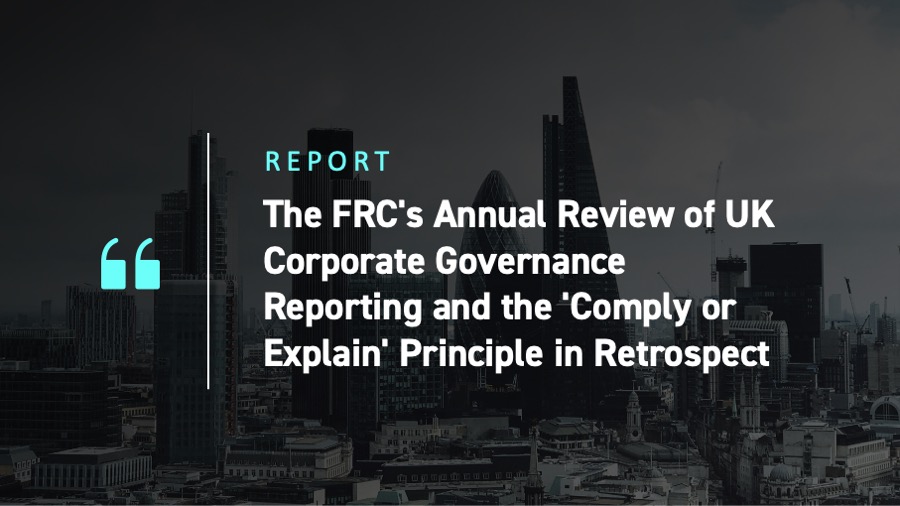In November 2024, the UK’s Financial Reporting Council (FRC) published its annual review of corporate governance reporting for 2024 in order to outline its findings before companies begin to implement the updated UK Corporate Governance Code (the Code) from January 2025.
The main findings of the review were as follows:
- In relation to the ‘comply or explain’ principle, the FRC noted that fewer companies had departed from the Code. This was primarily attributed to increased compliance with the alignment of Executive Director pension contributions with those available to the wider workforce.
- The FRC reported that it was encouraged to see that some companies had begun to update their risk management and internal controls reporting, particularly in relation to the mitigations put in place to manage their principal risks. The Code’s Provision 29, which expects companies to report on the effectiveness of risk management and internal controls, comes into force from 2027. It was therefore noted that “reporting on the effectiveness of internal controls remains at an early stage”.
- In its review of shareholder and stakeholder engagement, including workforce engagement reporting, the FRC focused on whether companies reported effectively on the outcomes of their engagement, as one of the key areas of focus for the updated Code. In relation to this, it found some examples of good practice.
- With regard to its Audit Quality Reviews, the FRC found that there had been an increase in the level of inspection results disclosure.
- On the issue of director overboarding, it found that reporting in this area was generally good, with many companies “setting out clearly the other commitments of their board members”.
On balance, the FRC concluded that, although reporting quality “remains strong, there is still a need for more concise, outcomes-focused disclosure and enhanced reporting on risk management and internal controls”.
The ‘comply or explain’ principle in retrospect
Early in 2024, ISS reported on the FRC’s changes to the comply or explain principle in the updated version of the Code. In that article, we noted that, while the principle remained one of the cornerstones of the Code (and UK corporate governance practice more generally), the FRC stated that comply or explain disclosures sometimes proved formulaic in nature, with reporting often providing little detail in relation to what governance practices a company had actually carried out. As a result, a minor amendment was made to the principle, with the updated Code encouraging companies to report on board decisions and their outcomes in the context of their strategy and objectives.
This amendment has been reflected in the FRC’s annual review. As with the Code (and its earlier iterations), the regulator has emphasised the flexibility of companies to deviate from its principles, while at the same time maintaining that any deviation should be accompanied by an explanation. However, of particular note in the annual review is the FRC’s expectation that such explanations should be “cogent” and “high-quality”. While the FRC stated that it found it encouraging that companies continue to depart from some provisions of its Code, it nonetheless acknowledged that “there remains some room for improvement in the quality of explanations”.
This aligns with the new Code’s “greater emphasis on the importance of outcome-based reporting”, as well as the FRC’s efforts to reduce boilerplate reporting in explaining any deviations. According to the review, the explanations provided by companies often proved “vague and lacked a clear rationale for why the company did not comply with the provision. In some instances, it was difficult to determine how the departure from the provision was in the company’s interests.”
The FRC also noted that some companies had expressed concern that explanations for deviating from provisions may lead to shareholders voting against resolutions at meetings. However, in reply the FRC stated that clear and meaningful explanations are important, as they influence investors and enable them to make informed decisions in relation to the company’s application of the Code’s provisions.
ISS’ UK Benchmark policy approach to comply or explain
ISS’ approach to the comply or explain principle generally reflects that of the FRC, as emphasised in its recent annual review. The ISS UK and Ireland voting guidelines represent a “policy-based approach”. However, it is recognised that companies can have good reasons for deviating from market practice or adopting unusual corporate governance arrangements that may better suit their specific circumstances. Consequently, ISS UK Benchmark voting recommendations are often made based on the cogency and quality of a company’s explanation for any deviations from market practice.
By: Tom Inchley, UK Research, ISS Governance



